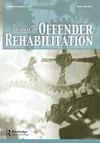Insight to wellbeing: a pilot randomized trial of a 3 principles intervention to the alleviation of psychological suffering among incarcerated women
IF 1.1
Q3 SOCIAL WORK
引用次数: 0
Abstract
AbstractObjective: Evidence suggests incarcerated individuals have high rates of mental health difficulties, and that incarcerated women face greater trauma-related than incarcerated males. The current study investigated efficacy of an acceptance-based, insight-oriented treatment approach to alleviate mental health challenges in incarcerated women.Method: Incarcerated females (N = 90) were recruited from a medium security facility and were randomized to either the treatment condition (n = 49) or a waitlist control (n = 41). Emotion dysregulation, psychological inflexibility, global mental health, and trauma symptoms were assessed at baseline, post-course, and 6-month follow-up.Results: A significant main effect of treatment was found for all primary outcomes at post-course and 6-month follow-up. Results yielded significant mean differences between time points for the treatment condition for all primary outcomes from baseline to post-course, and baseline to 6-month follow-up.Conclusion: Results suggest the acceptance-based, insight-oriented treatment approach is efficacious for incarcerated women. A purposed mechanism of the intervention is discussed.Keywords: acceptance-basedpsychological inflexibilitymental healthemotion dysregulationthree principlesincarcerated women AcknowledgementsAuthors wish to thank interventionists and those who contributed to the final product of this research endeavor.Disclosure statementNo potential conflict of interest was reported by the author(s).Data availability statementData is available upon reasonable request.Additional informationFundingThis work was supported by Three Principles Research & Consulting, LLC under Grant: 3PRC1.2019.洞察幸福:一个试点随机试验的三个原则干预,以减轻心理痛苦的监禁妇女
摘要:目的:有证据表明,在押人员的心理健康问题发生率较高,女性在押人员比男性在押人员面临更大的创伤相关问题。目前的研究调查了以接受为基础,以洞察力为导向的治疗方法对缓解监禁妇女心理健康挑战的有效性。方法:从一个中等安全设施中招募被监禁的女性(N = 90),随机分为治疗组(N = 49)和候补组(N = 41)。在基线、疗程后和6个月随访时评估情绪失调、心理不灵活、整体心理健康和创伤症状。结果:在疗程后和6个月的随访中,所有主要结局均有显著的主效果。结果显示,从基线到疗程后,以及基线到6个月随访期间,所有主要结局的治疗状况的时间点之间存在显著的平均差异。结论:以接纳为基础,以领悟为导向的治疗方法对监禁女性是有效的。讨论了干预的目的机制。关键词:接受基础心理不适应心理健康运动失调三原则监禁妇女致谢作者希望感谢干预主义者和那些为这项研究的最终成果做出贡献的人。披露声明作者未报告潜在的利益冲突。数据可用性声明数据可在合理要求下提供。本研究由三原则研究与咨询有限责任公司资助,资助号:3PRC1.2019。
本文章由计算机程序翻译,如有差异,请以英文原文为准。
求助全文
约1分钟内获得全文
求助全文
来源期刊

Journal of Offender Rehabilitation
SOCIAL WORK-
CiteScore
1.60
自引率
0.00%
发文量
24
期刊介绍:
The Journal of Offender Rehabilitation is a multidisciplinary journal of innovation in research, services and programs in criminal justice and corrections. The journal is an essential professional resource for practitioners, educators and researchers who work with individuals involved in the criminal justice system and study the dynamics of rehabilitation and individual and system change. Original research using qualitative or quantitative methodology, theoretical discussions, evaluations of program outcomes, and state of the science reviews will be considered.
 求助内容:
求助内容: 应助结果提醒方式:
应助结果提醒方式:


